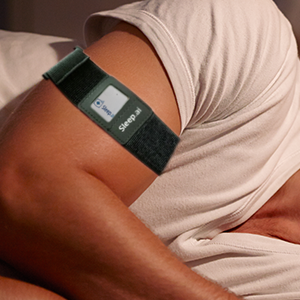
Snoring is a sound that results from air causing the tissues of the palate and throat to vibrate during your sleep. It occurs when your breathing is partially obstructed, due to relaxation of your muscles during sleep. Snoring during sleep may be a sign, or first alarm, of
obstructive sleep apnea (OSA).
Risk factors
In general, snoring can be caused by one or more of the following:
- Throat weakness, causing the throat to close during sleep.
- Mispositioned jaw, caused by tension in the muscles.
- Obesity and excesive fat situated in and around the throat.
- Obstruction in the nasal passageway, for instance because you have a cold.
- Obstructive sleep apnea.

- Sleep deprivation.
- Substances such as alcohol or other drugs that induce relaxation of the throat muscles.
- Your tongue dropping in the back of your mouth, when you sleep on the back.
- Smoking weakens and clogs your throat.
Remedies
The most common remedies aim at clearing obstruction in the airways. For this reason the first advices are to stop smoking, lose weight, avoid alcohol close to bedtime and sleep on the side, to avoid the tongue falling in the back of your mouth. Other remedies are the use of nasal sprays and nasal strips.
More invasive remedies include the use of dental devices and CPAPs, or continous positive airway pressure, a device that provides a constant, increased air pressure to prevent airway narrowing.
About 70% of all people only snore when they sleep on their back. Scientific research shows that peolple sleeping on their back can have POSA;
Positional Obstructive Sleep Apnea.
This is caused by complete or partial obstruction of the upper airway. Moving to your side opens the airway. Our app detects snoring and sends a signal to the Anti-Snore Wearable, making it vibrate. You turn over to your side again and the snoring stops.
 Snoring is a sound that results from air causing the tissues of the palate and throat to vibrate during your sleep. It occurs when your breathing is partially obstructed, due to relaxation of your muscles during sleep. Snoring during sleep may be a sign, or first alarm, of obstructive sleep apnea (OSA).
Snoring is a sound that results from air causing the tissues of the palate and throat to vibrate during your sleep. It occurs when your breathing is partially obstructed, due to relaxation of your muscles during sleep. Snoring during sleep may be a sign, or first alarm, of obstructive sleep apnea (OSA).



